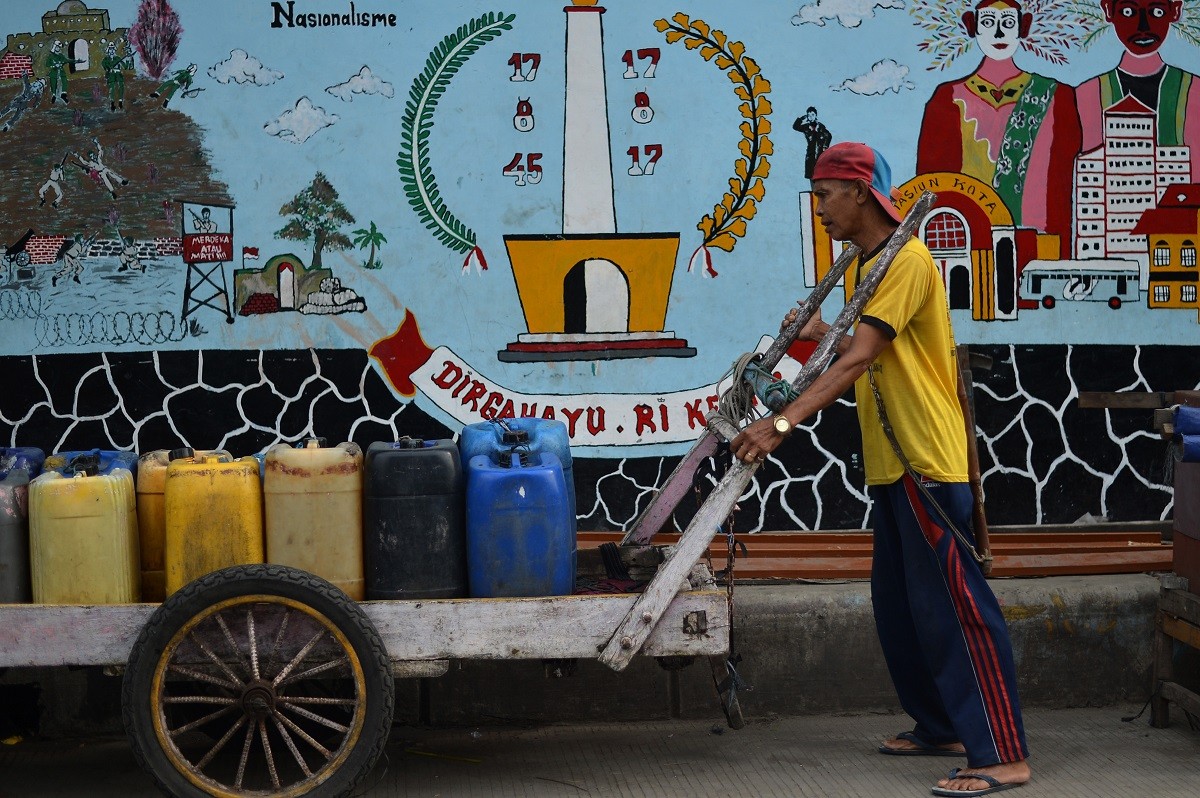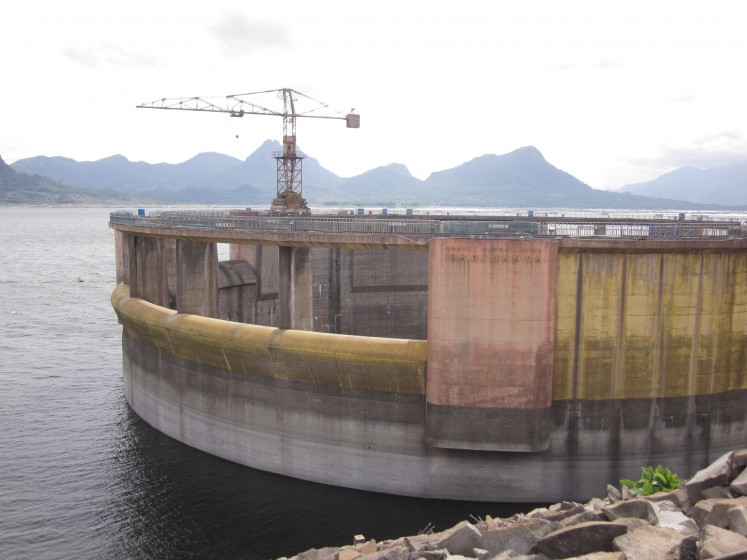What you need to know about Jakarta’s water privatization
Change Size
 The World Bank reports Jakarta’s poor households have to spend 13 to 25 percent of their income on water. (Antara/Wahyu Putro A.)
The World Bank reports Jakarta’s poor households have to spend 13 to 25 percent of their income on water. (Antara/Wahyu Putro A.)
A
group of Jakarta residents have clinched a victory in a long legal battle against tap water privatization after the Supreme Court ruled in their favor in October 2017. Why are they against privatization? The Jakarta Post has compiled the most essential information about the issue.
What’s the story behind privatization?
Jakarta’s water was managed by city-owned PT PAM Jaya. However, under the advice of the World Bank, in 1995 then-president Soeharto ordered water privatization, appointing two foreign companies without open bidding. The World Bank believed privatization was the cure for the failure of Jakarta’s public water delivery and unequal access to water. Private companies are expected to deliver better management, thus providing the necessary investment for the water company.
On June 6, 1997, PAM signed a 25-year agreement with French Suez Environment, which together with Salim group founded PT PAM Lyonnaise Jaya (Palyja) and British Thames Water with Soeharto’s son Sigit Harjojudanto through PT Kekar Thames Airindo, now PT Aetra Air Jakarta. Salim group was owned by Lim Sioe Liong, or Sudono Salim, a tycoon who was known as Soeharto’s close ally.
The contract said the two private firms would pay PAM Jaya’s debt. In 1991, the World Bank lent US$92 million for PAM Jaya to improve the service. Before privatization, in 1996, PAM Jaya recorded only 45.3 percent tap water coverage and 57 percent of non-revenue water.
There was an effort to make Palyja public by acquiring the shares via city-owned PT Jakarta Propertindo (Jakpro), which was aborted in 2015. Aetra was owned by Deputy Governor Sandiaga Uno before he sold his shares to Salim “to avoid conflicts of interest”.
The battle to end Jakarta’s water privatization began in November 2012, when the Coalition of Jakarta Residents Opposing Water Privatization (KMMSAJ) filed a class action lawsuit to annul the 1997 contract on the basis that the partnership had failed to serve the people in the city.
What is the condition of water coverage in Jakarta?
Jakarta’s water distribution is unequal against the poor. Under the Dutch colonial administration, only affluent residential areas enjoyed direct water pipe access. After independence, the pattern persisted.
A United Nations Development Programme (UNDP) report, citing data from the Kampung Improvement Program (KIP) and the World Bank, found that in the 1970s, 90 percent of residents in kampungs did not have access to water pipes, despite being home to 80 percent of the population. Lack of sanitation exacerbated the problem, as clean water sources such as rivers or ponds degraded in quality due to human and household waste.
In 2015, tap water only covered 60 percent of Jakarta’s residents, according to PAM Jaya president director Sriwidayanto Kaderi. By 2016, the number of residents connected to a piped water system amounted to 3,420,000 people.
The Amrta Institute for Water Literacy, however, calculates that tap water only supplies 35 percent of Jakarta’s total water demand, because even though households and commercial buildings are connected to tap water service, they still use groundwater.
The urban poor in North Jakarta have it harder: they buy from local vendors, or use groundwater, surface water and others. The World Bank reported Jakarta’s poor households have to spend 13 to 25 percent of their income on water.
According to the Jakarta Water Resources Council, the country's capital can only supply 2.2 percent of its total demand for clean water from the Krukut River, with another 80 percent coming from the Jatiluhur Reservoir and about 20 percent from Cisadane River in Tangerang, Banten.

How does privatization work?
Privatization means that PAM Jaya only acts as a supervisor, while the operations are in the hands of private companies. Palyja is responsible for water operations in the western half of the city, while PT Aetra Air Jakarta is responsible for the eastern half. Both share high-income customers in business districts.
The two water operators are responsible for ensuring the raw water supply, cleaning the raw water, pipe network and customer service.
PAM Jaya pays a “water charge” to the two private operators to supply water to the residents while customers pay “water tariffs”. Based on the contract, the water charge is increased every semester, but the water tariff cannot be automatically increased because it often involves a political process with the City Council. As a result, water charges are mostly higher than the tariffs, increasing PAM Jaya’s expenses. A former PAM Jaya director, Maurits Napitupulu, said if the rate continued, PAM Jaya would have to pay Rp 18.2 trillion by the time the contract ended in 2022.
Key dates on the water privatization debacle:
- 1992: World Bank advised privatization
- 1995: Soeharto appointed two companies for privatization
- June 6, 1997: privatization agreement signed
- Feb. 1, 1998: private operation started
- June 2013: KMMSAJ filed a lawsuit annulling 1997 agreement
- March 24, 2015: Central Jakarta District Court approved the lawsuit
- Feb. 2016: Private companies won an appeal at Jakarta High Court
- Oct. 2017: Supreme Court annulled the 2016 appeal win
- March 2018: People protested the ongoing cooperation with private companies
Why do Jakarta’s citizens reject water privatization?
The KMMSAJ said water privatization had failed to guarantee an adequate supply of clean, potable water in the capital. After almost 20 years of operations, the two private firms have failed to reach the target agreed in the 1997 contract.
The targets after privatization in the 1997 agreement were to have 98 percent service coverage and to decrease non-revenue water to 20 percent by the 20th year. In 2015, the water coverage for both private operators was 59 percent and the leakage 44 percent.
Meanwhile, the group complained the water tariffs were not affordable for the city’s poor residents. Jakartans pay around Rp 7,000 (71 US cents) per cubic meter, with the exception of low-income residents who pay only Rp 1,050 per cubic meter.
The failure to reach the water coverage target has defeated the purpose of privatization as suggested by the World Bank: to provide affordable clean water also for the poor.
As a result, the poor have to buy expensive clean water from other sources. According to the World Bank, poor households in Jakarta have been spending an estimated 13 to 25 percent of their income on water. Ministerial Regulation No. 23/2006 on water rate adjustment states that a household should not have to spend more than 4 percent of its income on water necessary for daily use.
The Central Jakarta District Court approved the KMMSAJ’s lawsuit in 2015, ending water privatization. Presiding judge Iim Nurkhoim said water privatization had been negligent in fulfilling the human right to water for Jakarta’s residents. Article 33 of the 1945 Constitution states clearly that land and water and the natural resources contained therein shall be controlled by the state and shall be used for the greatest prosperity of the people.
In 2016, however, the Jakarta High Court overturned the lower court’s decision, granting the rights once again for water privatization. The verdict was mainly based on technicalities of the KMMSAJ’s lawsuit.
What is the Supreme Court’s 2017 verdict on water privatization?
The Supreme Court approved a cassation appeal filed by the KMMSAJ and annulled a 2016 verdict issued by the Jakarta High Court. The verdict states that privatization had not improved the service of water supply in term of quality, quantity and continuity.
The Supreme Court ordered the termination of water privatization, as it contravened Jakarta’s Bylaw No. 13/1992 on city-owned water company PAM Jaya. Jakarta Governor Anies Baswedan has said he was committed to respecting the Supreme Court’s ruling that ordered a stop to the privatization of pipe water supply in the city.
However, PAM Jaya has insisted that it would continue to cooperate with the two private companies, but would restructure the agreement, giving PAM Jaya more authority in the operation. The Jakarta administration will form a team pertaining to the controversial restructuring between city-owned tap water company PAM Jaya with private-run PT PAM Lyonnaise Jaya (Palyja) and PT Aetra Air Jakarta, an official said.









